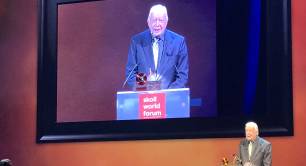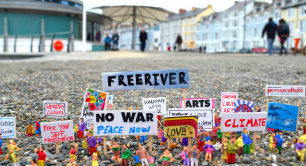President's daughter brings positive disruption to health system
A global health leadership programme run by the daughter of a former US president.
Online platforms to boost clean energy and combat sexual assault.
Technology to help governments and citizens make better public services.
A microsavings initiative to help thousands of smallholder farmers improve harvests and lift themselves out of poverty.
A social enterprise energy ecosystem that increases the accessibility, affordability and sustainability of renewable energy for the poor...
Step forward the six winners of the 2018 Skoll Awards for Social Entrepreneurship – five women and one man, who share $7.5m to take their initiatives to the next level.
The Skoll Awards are one of the highlights of the annual Skoll World Forum on Social Entrepreneurship, which was founded by eBay pioneer Jeff Skoll 16 years ago and took place again this week in various lecture halls, theatres and seminar room around the iconic university colleges, business school and city of Oxford, UK.
Each year, some of the world’s most influential social entrepreneurs, key thought leaders, and strategic partners from 65 countries gather for four days to exchange ideas, solutions, and stories.
The forum’s mission is “to accelerate the impact of the world’s leading social entrepreneurs by uniting them with essential partners in a collaborative pursuit of learning, leverage, and large-scale social change”.
Notable speakers have included Malala, Sir Richard Branson, Al Gore, Desmond Tutu, Kofi Annan and Gordon Brown, not to mention leading musicians and actors such as Bono, Annie Lennox, Ben Kingsley and Robert Redford. This year’s stars included former US President Jimmy Carter and singer songwriter Aloe Blacc – who serenaded delegates at the awards ceremony with renditions of “I need a dollar” and “Wake me up”.
Celebrity also featured in this year’s award winners list, in the form of Barbara Pierce Bush, daughter of former president George W. Bush and granddaughter of president George H.W. Bush.
However, to focus on Ms Bush’s celebrity status would be to devalue the extraordinary work that she and her organisation, Global Health Corps, are achieving in creating a new breed of leaders to transform and democratise health systems from the USA to Rwanda.
“Historically, global health interventions have reflected the global power structure—Western designed, male-led, top-down responses to acute disease outbreaks offering only incremental improvements to health systems,” explains the Skoll Foundation.
“Global health leaders are rarely representative of the populations they serve, nor diverse in academic or professional discipline. As a result, the design of health interventions often overlooks the perspective of those being served. Meanwhile, the health workforce lacks needed capacities such as logistics, finance, and communications.”
Global Health Corps (GHC) strives for a more bottom-up health system championed by a growing network of new leaders. It recruits diverse young professionals and places them into existing health organisations and government agencies in East and Southern Africa and the United States to address current capacity gaps.
Nearly 900 fellows have completed the programme at more than 100 health organisations and government ministries. GHC’s unique "co-fellow" model also pairs a national and an international fellow to promote cross-cultural collaboration and ensure inclusion of diverse perspectives and approaches.
While we’ve made tremendous strides in global health, it is critical to acknowledge that changemakers come from everywhere
“Diversity and inclusion matters enormously in global health,” says Bush. “Historically we’ve seen a lot of leaders – and we’re certainly standing on their shoulders, these giants who have affected change in global health – and they have often been from medical backgrounds, they’ve often been academic, they’ve often been Western. And while we’ve made tremendous strides in global health, it is critical to acknowledge that changemakers come from everywhere.
“Ever since we started when we met with organisations that we’d partner with they told us about their biggest gaps and what was most exciting to us is that they were requesting systems thinkers, they were requesting architects, they were requesting those with finance backgrounds, which meant we could open up the field to young leaders who might have been passionate about global health but didn’t see how they fit.
“Everybody that joins Global Health Corps is 30 or under, they come from 16 countries, 50% from eastern or southern Africa, they speak 42 languages, and this diversity we have amongst our community is critical to us.”
Dr Agnes Binagwaho, Vice Chancellor, University of Global Health Equity, and former Minister of Health in Rwanda, says in a film made about GHC for the Skoll Foundation that the value of Global Health Corps is that it exists “not to solve the quantity problems, but to solve the quality”.
Dr Binagwaho continues: “What it takes to change a system is first of all we need leaders to lead that change, we need people that are convinced that health is a human right, we need people that are convinced that it’s not the money you invest in the health sector, it’s how that money is equitable and shared.”
These pioneering leaders, together with their teams and partners, demonstrate the potential for lasting equilibrium change.
Praising the six award winners, Sally Osberg, President and CEO of the Skoll Foundation, said: “Working side-by-side with those most affected by violence, injustice, or exclusion, these six social entrepreneurs—five of whom are women—have drawn upon an array of technologies to design their innovative solutions.
“In tackling issues ranging from financial inclusion to clean energy to poverty alleviation, these pioneering leaders, together with their teams and partners, demonstrate the potential for lasting equilibrium change.”
Osberg steps down
Sally Osberg also announced that she was stepping down from the helm of the organisation she has led since Jeff Skoll recruited her 2001.
Skoll paid tribute to her work: “Sally has been a major pillar of my work to better the world for 16 years,” he said. “I was admittedly new to philanthropy after leaving eBay. Having Sally by my side, with wisdom that transcended our work together, has been a joy and a privilege.”
Her imagination, rigor, warmth, and passion for protecting the vulnerable has served all of us remarkably well.
He added: “Social entrepreneurship and the Skoll Foundation would simply not be the same without her vision and tireless devotion to improving the lives of the vulnerable. Her imagination, rigor, warmth, and passion for protecting the vulnerable has served all of us remarkably well.”
Osberg will continue at the helm of the Skoll Foundation until a new CEO is in place. She will then begin a new role as Senior Advisor to Jeff Skoll and the Jeff Skoll Group of organisations.
The six 2018 Skoll Awardees are:
Angaza – Lesley Marincola
Callisto – Jess Ladd
Code for America – Jennifer Pahlka
Global Health Corps – Barbara Pierce Bush
myAgro – Anushka Ratnayake
SELCO – Harish Hande
Further information, film footage profiling all the award winners and coverage from forum sessions can be accessed on the Skoll World Forum website.


